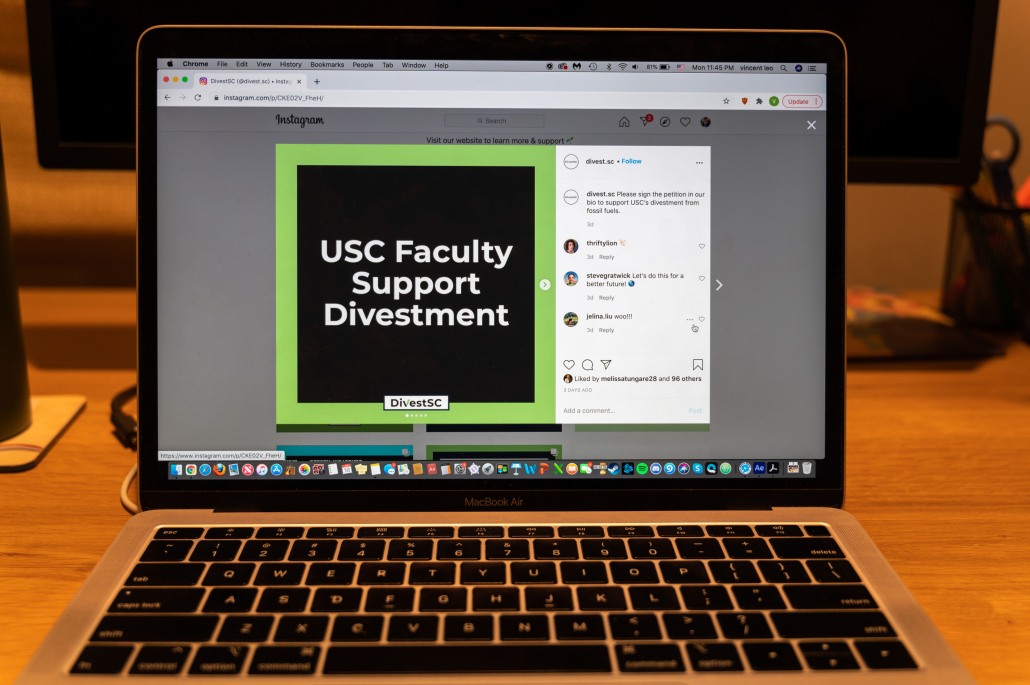Academic Senate votes in favor of fossil fuel divestment

In a nearly unanimous vote, USC’s Academic Senate voted in favor of fossil fuel divestment mid-December, following efforts by various student organizations, including the Environment Student Assembly and the student-led environmental campaign DivestSC, to urge the University to divest the $277 million currently in fossil fuel assets. The vote also affirmed the resolutions passed by the Undergraduate Student Government and the Graduate Student Government in early November.
DivestSC chair Nathaniel Hyman feels that the vote is an additional step in USC’s path to divest from fossil fuels, however, the resolution does not bind the University to any specific method to actually divest. Instead, the vote displays faculty support for the resolution presented by USG and GSG, and places increased pressure on USC’s Board of Trustees to move toward divesting.
Tianna Shaw-Wakeman, an alumna who co-founded DivestSC in 2019, said the vote fits well with the long term goal of DivestSC and other environmental groups on campus, as their efforts have been to unite different sections of USC’s campus under the same goal of divestment.
“We wanted to make sure that we were touching every single component of the University, so we got support from USG, we got GSG, we now have faculty and we’re working on getting more support from alumni groups,” Shaw-Wakeman said. “So that just shows the Board of Trustees, specifically the Investment Committee, that multiple stakeholders at USC are interested in the same thing.”
President of the Academic Senate Paul Adler said the vote was essential to demonstrate the importance of USC facing climate change.
“[It is] the survival of civilization on this planet,” said Adler, a professor at the Marshall School of Business. “If we don’t do something about climate change, really, really fast, all hell’s going to break loose. And this is just a tiny little contribution to that bigger effort.”
Adler also said the Academic Senate vote is one move among many that faculty members have attempted to make toward encouraging USC to become more sustainability-oriented. In 2019, President Carol Folt formed a Presidential Working Group on sustainability in which faculty, students and staff across the University formulated proposals for long-term sustainability strategy proposals that focused on teaching, research and operations.
“For a long time [it] was a pretty ad hoc group of mainly operations managers … who were interested in seeing USC doing something like this without any mandate having come from above,” Adler said. “So it’s a kind of interesting example of innovation through middle management … it’s not uncommon that new ideas arise in the middle ranks of management who then sell them to senior managers.”
Hyman said he felt the vote was significant as it displayed faculty support for an effort that had grown in popularity among the student population. However, Hyman said he still believes the University could be more transparent and is unsure of any policy changes to take place following the vote.
“President Folt has been supportive, she’s met with us numerous times … but we still need the support and communication with other members of the Investment Committee,” said Hyman, a senior majoring in public policy. “We still know nothing … Has there been a change in policy? We don’t know any of that.”
USG Senator Alexis Areias, sponsored the original divestment resolution passed by USG that would serve as a model for the resolution presented to the Academic Senate. Although the Senate’s vote is a step forward to the University’s fossil fuel divestment, Areias, a junior majoring in political science, emphasized that resolutions do not necessarily mean concrete change, and the process for actual divestment is a long one.
“It’s really difficult for us to make tangible change with these resolutions so it wasn’t necessarily making a direct change, but [USG], as representatives of the student body, are urging the administration … to make these changes,” Areias said.
For both Hyman and Shaw-Wakeman, they said they believe in the importance of USC students doing their part by making the University and society more environmentally-friendly, whether through looking at one’s own impact on the environment or the different clubs on campus.
“[Students can] bring attention to this, make this something that the University needs to respond to, make it something that’s not ignored for another 10 months,” Hyman said.
According to a USC media representative, the issue will be discussed in an upcoming Investment Committee meeting.

